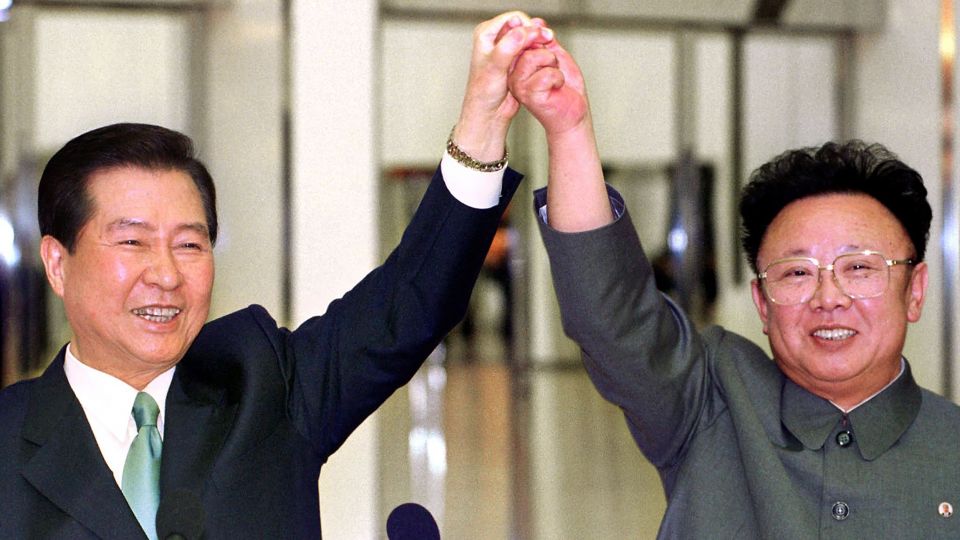March 14, 2018
North Korea’s Kim relies on an old playbook with new concessions, luring Trump into a rushed, haphazard meeting.
Kim Jong-un’s verbal statement expressing willingness to open denuclearization talks with the United States and Donald Trump’s surprising acceptance of the invitation to meet as soon as May suddenly eased fears of nuclear conflict on the Korean Peninsula. But this dramatic sequence of events, full of mystery and hope, carries elements of instability with the potential of derailing the negotiating process aimed at denuclearization of the peninsula. North Korea’s record of duplicity inspires little trust in this latest proposal, and Kim’s nuclear and missile capability has moved too far along to think that he might negotiate it away for a price. Given endless tensions emanating from the unpredictable regime for two decades, it’s inconceivable that Washington or Seoul would accept a partial settlement leaving North Korea’s nuclear arsenal frozen, if not defanged.
Kim’s statement follows the peaceful mood of the PyeongChang Winter Olympic Games and the US ignoring Kim’s bid for dialogue. So, Kim moved from supporting the China-endorsed “double-freeze” formula – a proposition under which he would suspend nuclear and missile tests in exchange for the US halting annual military exercises – to the US demand for outright denuclearization. His goal is in question, whether this is another trap for buying time or whether the nation is buckling under US-led global economic sanctions. Japanese officials suggest that increasingly effective sanctions, including marine interdiction operations against ship-to-ship oil transshipments involving Chinese vessels, have forced Kim to change his strategy.
In Seoul, independent analysts are dismayed that neither Chung nor others at the dinner probed Kim for details, such as whether he is ready to accept inspections of nuclear facilities. “The key issue is not declaration of intent,” and Chung left Kim off the hook, according to Korea University Professor Kim Sung Han, who has spent decades studying North Korea. The devil is in the details, and the North has a history of reneging on promises by rejecting inspection and verification. The US insists on a complete formula called CVID – Complete, Verifiable, Irreversible Denuclearization. From the 1992 inter-Korean Basic Treaty to the 1994 Agreed Framework and the 2005 Six Party Agreement, North Korea has broken every agreement on its denuclearization accords.
Surprisingly, neither Chung nor Suh Hoon, Seoul’s national intelligence chief, also at the dinner, asked for a formal, documented statement affirming Kim’s talking points. They jotted down his statements by hand in a notebook, the only record on which to base Kim’s remarks, leaving room for later repudiation. Nor, for that matter, was it clear if Trump’s agreement to meet rests on a formal invitation from Kim or whether it was relayed by Chung by word of mouth.
South Korea’s security was relegated to footnote status as Kim and the envoys spent most of the time talking about US–North Korean relations. Almost as sop to Seoul, Kim said he would meet with Moon in April at the Panmunjom armistice village, what would be his first face-to-face talk with a South Korean leader. Almost tongue in cheek, Kim said the North would refrain from attacking the South with “nuclear or conventional weapons,” a moot point given the US–South Korean alliance. No apology was made for the North Korean torpedo attack in 2000 that sank the South Korean Navy corvette with 46 men or a subsequent artillery barrage against Paengnyong Island killing civilian farmers.
Much about this rushed and haphazard meeting remains a mystery. The North has not informed its 25 million people about the proposed summit, and many South Koreans worry about Trump pouncing on an ill-advised deal. Probably in response to such concerns, Suh Hoon said during a newspaper interview that Seoul will be in the driver’s seat on the summit process, but that questions like withdrawal of US troops from South Korea or proposed changes in the current alliance structure will not be the subject of concessions.
Kim may not accept such limits. For two decades, the North has not wavered from the idea that a nuclear arsenal constitutes its last pillar of survival with a nuclear state enshrined in its state constitution since 2012. Kim has taken to reminding top officials of the fate of Iraq’s Saddam Hussein and Libya’s Muammar Gaddafi after giving up their nuclear programs. For North Korea, though, a nuclear arsenal is also “the chief instrument for attaining reunification of the peninsula under its terms,” says Yoon Dok Min, veteran head of the Korea National Diplomatic Academy in Seoul. In short, Kim cannot give up the nuclear program without risking his family’s role in a reunified Korea – a point Trump should consider in preparing to deal with Kim.
(This article was written by Shim Jae Hoon and originally appeared in Yale Global Online.)


